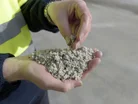Lithium Could Hold Key to Sustainable Cement Production

A ground-breaking study has uncovered a potential solution to two pressing issues in the construction and energy sectors: the depletion of a key ingredient in cement production and the waste management challenges in lithium production.
Fly ash is a by-product of coal combustion in power plants and is commonly used to improve the strength and durability of cement. It is a crucial additive in cement production, yet is becoming scarce due to the phasing out of coal-fired power plants.
However, by-products from the production of lithium for use in EV batteries is emerging as a potential replacement, and is said also to offer environmental benefits and improved strength.
The research was conducted by the German Lithium Institute, and supported by Rock Tech Lithium, a Canadian company. It focuses on leached spodumene concentrate (LSC), a by-product of lithium production.
LSC occurs naturally in minerals and also as a by-product of industrial processes. It has been shown to be an effective substitute for fly ash. Significantly, the research indicates that adding 20% LSC to Portland cement – the most widely used cement globally – increases its compressive strength by 10%, and that it can also reduce CO2 emissions.
The lithium-cement connection
The study was a collaborative effort involving several key players in the construction and lithium industries. These include Rock Tech Lithium, which is planning to build Europe's first lithium converter in Germany, with an annual production capacity of 24,000 tonnes of lithium hydroxide – enough to supply 500,000 electric vehicle (EV) batteries.
The company is also developing recycling capabilities, further enhancing its sustainability credentials.
As the electric vehicle market grows – and the world moves away from from fossil fuels – demand for lithium is expected to surge. In light of this, the study opens up new possibilities for synergy between the lithium and construction industries, signalling the potential for a circular economy model that benefits both sectors.
Environmental and economic implications of lithium by products
The findings have significant environmental and economic implications:
- Reducing CO2 emissions By replacing fly ash with LSC, the cement industry could maintain its CO2 reduction strategies despite the decline in coal power generation. This aligns with global efforts to decarbonise the construction sector, one of the largest contributors to greenhouse gas emissions.
- Zero-waste strategy Rock Tech Lithium is pursuing a zero-waste strategy at its planned Guben facility. The company aims to become the world's first zero-waste lithium producer by completely reusing its by-products.
- Supply chain resilience The use of LSC in cement production could ensure regional supply security for the German cement industry, reducing reliance on imported materials and shortening supply chains.
Dr Thomas Neumann, Head of Research and Development at SCHWENK, emphasised the potential of this innovation: "The use of industrial residues from lithium production in cements and concretes significantly contributes to the conservation of valuable natural resources. Through innovative material use, we make an important contribution to achieving our sustainability goals".
******
Make sure you check out the latest news at Construction Digital, a BizClik brand.
- Trackunit: the Future of Technology & AI for ConstructionTechnology & AI
- Tarmac Sustainability Report: Green Strides for ConstructionSustainability & Green Building
- Urbanisation ‘Driving Concrete and Cement Growth’Built Environment
- PERI Brings Integrated Scaffold Solutions to ConstructionPlanning & Design




